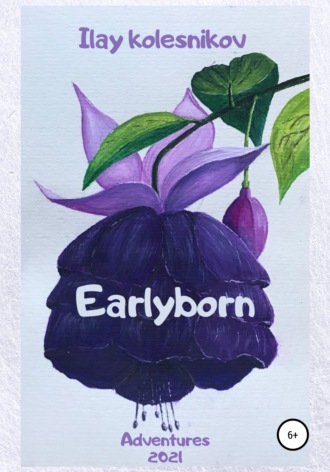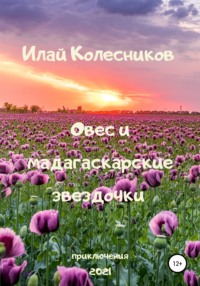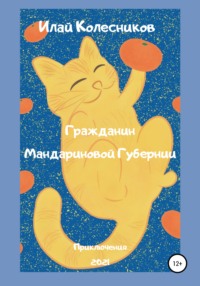
Полная версия
Earlyborn
As soon as Zhenia came in Paris, he began dreaming about one. He scarcely considered that city as his future residence. Zhenia simply wanted to go for a row on the Sena, then set sail with Earlyborn: he intended to go round Africa or Cape Horn and go back to Paris to move towards home—Russia. He imagined how he, terribly jaded, tanned and with that outstanding glimpse, would sit on the train to Amsterdam from where he would go to Moscow by bus. He saw himself, exhausted, yet full of spirit of ventures and happiness, coming in his hometown, Irkutsk to continue his job as taxi driver, to exult at life again and again; he even hoped to gather with friends to go fishing on the Baikal and to visit his parents in the countryside in summer, and, perhaps, life would bring him some more golden raffle tickets for he bought the trip for his sister with one of them. Let us see whether Zhenia’s dreams on his and his sister’s future will come true. But now he simply decided to have a walk.
Speaking about Dionysius, a friend of Luisian, the chef of drunken bulls, created by Earlyborn’s imagination. How was he there with no money and no friend settling his life? How would he find Luisian who had forgotten his mascot—a bronze bee—in his suit pocket? Yet would Luisian bother looking for it? However, Dionysius knew and saw with his own eyes how the mascot could affect that person. So, probably the lost bee was to be blame for the broken caravan… Yet Luisian found it roving over the ground near the place where they stopped. Fellows soon managed to mend their car. As Dionysius was a meticulous Argentinian he understood that as soon as his old friend discovered his lost mascot, something would definitely occur. Dionysius could not help leaving his acquaintance without his talisman, hence, he would directly pop into a shabby hut of one old fisherman, a bowing acquaintance of his, to drop belongings, and then he would go in search of money for Luisian. It turns, dear readers, that we have clinched at least one matter.
Some words about Luisian. It was hardly possible for Dionysius to seek for Luisian with no coordinates of his, even if he was in the nearest hut… What an idea, however! Maybe Luisian naturally made up his mind not to sail away from the Costa Rica shore and waited for some time, say, in order not to go to sea at night. Eventually, he had to do it as Earlyborn met Zhenka2. Instead of developing the story on the way to the shop, our heroine made Luisian sleep. Moreover, Earlyborn, seems, forgot that she located him back to France where he was to find his father. Well, doing it was forgivable. For a drowning man will clutch at a straw, and the play with imagination was that straw in waiting and grief for Earlyborn. She possibly created Ded Moroz as she remembered her brother… It is he, by the way, Italian, whom great half of this book is devoted! So Luisian decided to wait a bit and noticed the loss. Then he moved back towards the place where he said goodbye to Dionysius; apparently, he made his home in a neighbor to Dionysius hut. A hostess Lunight put him for the night. Yet she was not that sociable and immediately went to another room. I deem her a witch. There was a caldron in her closet where the smell of sour and mint filled the air… Luisian did not mind her absence and came out on the porch and started pondering, skipping pebbles across the surface of the water.
Chapter 4
Earlyborn and Zhenia started a long journey. They went out after lunch, walked along and across the Seine, visited the Notre-Dame and enjoyed the time, only they did not get into the Eiffel Tower. They did not do it only because Earliborn said, “I’ve got a lot more fascinating view behind my window!”, but still even after they went boating they felt lack of satisfaction from today’s stroll. Thus they came to a decision not to set out tomorrow (not to mention at the crack of dawn :) ), at least, after lunch or when they would be able to do something about that lack of satisfaction. When they headed for the home, they had a look at the Eiffel Tower, which Zhenia saw on his calendar in the kitchen and came across on the road to Paris many times: it was depicted in various banners, painted beautifully as patterns on trains, and it associated with memories about dreams of youth in his consciousness that towered above all his later life as the Eiffel Tower, and the sun, grown up for the day, was shining on the back of their heads. If you call in mind that incredibly pleasant sense in feet when you have just moved to another country, or observed your town from different side or been working as a food delivery man with no rest, and eventually sat on a bench ruled with the weight of you full with impressions head, you will realize the desire of Earlyborn and Zhenia to sit on a bench below their window and view the red blush of the aged sun. It was worth watching. Appearing out of depleted during winter chestnut brunches near the Eiffel Tower, the Sun gazed at wanderers with warm light, it had written an excellent ingenious poem. From her small travel backpack Earlyborn took a silvery thermos, which was getting the colour of setting beams as though they were not the beams, but the skates of the Sun, and the Sun was not the Sun, but a famous ice skater at the children New Year competition, who was invited there as a special guest. The thermos with the colour of skates smelled of something warm and light as a feather, maybe of steam, however, when Zhenia unscrewed the cover with his stronger hand—of hot mint tea from the Caucasus fields which they managed to brew being at old lady’s.
At times, we are asked questions on the meaning of life, at times we ask them, and that often mostly happens on the hoof, in a hurry; so is same with answers, for example: the reason to live is in a spruce. Live in the way you can gain the wisdom of that tree and may the events in your life pass as fresh as the smell of a spruce and fit together like needles on a brunch in the winter frost. You see it is heresy. Sometimes as now, drinking tea and looking at the disk of the setting Sun, you may well understand: the meaning of life is to always have a ready-brewed thermos of tea and see the Sun still setting but not hiding in the dark of the night. Zhenia shared tea with Earlyborn and, staring at the icy Sun’s rays, started musing over the idea of how it was good that his sister had exactly that name. To tell the truth, he loved his sister since she had grown up into that extraordinary individual. To tell the truth, he supposed himself particular mainly because his sister was so. As happiness is not everlasting, so the Sun, as it befits, also hid behind gloomy clouds of the time, left the dusk and the rest day, all remaining sunbeams, which were send there, down to the Earth, yet had not touched it, for the moon and night to eat. There were no more tea after some frost, some snow, the evening and the thirst took over the siblings. It must be said they were not disappointed on that account for the end of one is the occasion to start something another, new. An empty mug of tea is only the point to brew some new tea, which (just as you choose) may be hundred times better than the old one, as the Eiffel Tower happened to be more beautiful from the Earlyborn’s balcony than from its one.
Termination of any doing of your life has, definitely, a sprinkle of frustration. And the bigger this frustration is, the more opportunities to alter your future grow up. To excel yourself in doing your next action comparing to your previous might-have-been! Imagine what a great number of thoughts attacked your head in a brainstorm when you merely (it happened like that) could not get up in time for about a week in a row. Two weeks in a row… So how strong must your indignation be in the case when you cannot cope with yourself for a week or two? If your indignation is truly powerful and sincere, something should happen, something should come to your mind, something that will cause huge changes and give you an impulse, a portion of genius! Say you got rid of that very unhealthy habit or of mental disorder, which was on your road to the full living, and, all in all, not only will you be able to get up in time, but hear people and see their point as no one else under the sun can! The chief thing is to continue doing. How will you be tortured by the idea that you do everything but have nothing to reap if you do not continue, after all? You will more likely berate yourself for doing nothing, and, as a consequence, of course, will learn how to manage with everything, but it would be more time-consuming. The desire to work is said to emanate from a person himself.
Again sitting on her much loved tiny balcony, Earlyborn puzzled herself with only one question. It floated into an abyss of wind, into that cold time when two or three hours after the sunset passed away, “How am I to live?” Neither the Ursa Major, so suddenly appeared in the starless winter sky, neighboring the Orion’s belt, nor the young Venus could not or did not want to answer her question. Meanwhile Zhenia went to bed, and she was about going to do the same, yet she did not do that; on the contrary, she came out to the place which was the only one that could gladden her in Paris, and decided to immense herself again into the fairy-tale night of meditation and bright melancholy. Besides, the answer to the question she posed to the stars or gloomy twilight could guide her even not in Paris, but, for one, in Strasbourg or somewhere on the outskirts; she would go after the answer wearing her nightgown, well-tailored as fashionable as those winter patterns in the starry sky, only, being not ashamed of her slight bareness. I suppose, we all, naked and in nightgowns would be ready to run after that answer, like after the treasure fallen so unexpectedly as the Christmas wonder together with snow, and to creep as troublemaker kids somewhere in that snow in attempt to discover the answer as a needle in a haystack with the joy about the snow which the only one was present. There is still no answer, the snow does not fall in the darkness as on the head of grieve Paris night, and those who were lucky to unearth the answer one day, have already hidden, like needles of answers in the snow, in the earth interior, covered with seven blankets, or speak with each other in a secret place in a beggarly hamlet, so that it is impossible for us to find them anywhere. We are forced to sit in nightgowns—as a kind of sign to the fate and life showing that we are ready to run as it is, almost naked. Yet we are not yet those who deserve getting the answer. These speculations did not let Earlyborn feel better, and she, sipping a new cap of Dominican coffee, continued basking frosty beams of January cold. One aphorism is said to be familiar to you: he who seeks, will find; while Earlyborn was looking for the answer without giving up, by the way, a curious thought came into her mind: “We should live absolutely in movement for only looking ahead without dwelling on how you skate, you will grasp the process of skating at the life ice rink, and then and only then you will adore doing that.” “Nice,” Earlyborn said, observing the area beneath her balcony and the lights in the Tower, “but how to start focus on action?” Here is one of the main matters, which we are going to tackle throughout the book… For now Earlyborn examined starry sky: the Ursa Major was right above the roof of her house, illuminating the young lady with string of lights with shapes, similar to Christmas toys and fireworks. Earlyborn planned to draw a projection of the stars on her life, like with a thin brush of gouache on the space canvas, and to mark out the course to Antarctic precisely with these patterns. Enlightenment, seems, dawned on Earlyborn at that very moment :) All of a sudden, she understood that all miseries and failures which snowed her under, were not that important neither for her and certainly nor for the Madagascar cockroaches in her head, which visit any woman in Paris. She realized that she was to exult. She realized that if you have nothing to change in your life to be blissful or you have to alter everything, that means there is no need for you to change anything. Except for the attitude to life. On that joyful bass note Earlyborn continued her night adventures, forwarding her glance in the dreamworld. The left crater on the Moon started jerking…
Chapter 5
Luisian got up and was willing to continue working. And there was a phrase which learned him a lot for he had never heard it more often than now, in the house of the weird, although ultimately kind and generous hostess. “Carry on with work,” Lunight told her little child, whom she yesterday went tending to the closet, “keep working, otherwise you will not earn for your bread, and who will feed his mummy?” And the son went away, with some sparkle in eyes, obediently going on painting tin shapes. The case was that not long ago Lunight’s husband left her. However, it cannot be deemed that he actually was with her: he had small romantic relationships that resulted in a birth of a baby. When the husband (who is not really a husband—a villain) learned that his “sweetheart” would have children, he moved in a different residence. Yet Lunight was forgiving, and that is a greatest side of poor natures, who are stuck in nasty living. Poor people see through life and will see further; they will not lose the ability to experience that it is not money which is the main criterion in society to estimate people. Even not that: a person can be still that particular person, as a matter of fact, they can be more honorable with no money; a person remains himself in Africa, and money is a supplement which leads people for existence, not enjoying the life. All poor people believe in the absence of the reason for living, as they suppose the meaning to be only a direction, which compels us to work and live with the desire to live for the achievement of an obscure goal. That is what I intended to convey now, and I feel it is time to finish. So will do I. That is the end. Thank everyone, mother-father, one who listened is well-done.
But, wait a min-ute… “Thank everyone, mother-father, one who listened is well-done,” said Lunight’s child too on the stage of a small theatre in Costa Rica. Lunight and her six-year-old son made their living by selling toys—tin cans, which the ocean surf brought on the beach; they also performed for charity in a small children theatre. There were charity providers in Costa Rica, and Lunight got approximately a half of the money she earned at the fair. So Luisian learned the chief rule of the life: “Keep working.” Moreover (Lunight was so generous today), he was told the main principle of life: “Do not worry if you cannot obtain something—it happens! You live today, and, maybe will live tomorrow, in addition to that, you know that you lived and was full up yesterday, and the other things are not the reason to be sad. And this idea helps you to live; any imaginable meaning of life bring the idea that the very reason for being is simply to be, to live, and only this makes you happier, only for this reason you should work hard. Yet if you do work hard, but do not manage to do, what is then? You have clinched your aim – you are alive, and with you carrying on working, you may finally double what you have achieved.” There was, obviously, some fruit of Luisian’s deductions in these words for Lunight did not baffle her child with them. Everyone does doings, which they deem useful for themselves. At any rate, Luisian realized that it being always cheerful is a must, particularly when you do not know “How can I be alike? Speculating about being cheerful, following the life principles and dealing with life this way, Luisian spend the first half of the day and that marvelous time when you just start your doings, and it is like you do not live, but eat some fresh bread of life… Unfortunately, everything comes to its end, and these reflections blew away. Luisian got down to business, and those high spirits that attended his mind in Costa Rica faded away. Actions were required, and Luisian, as never before, started thinking over his situation. He sat, pondering about the development of diverse events and gazing at the life river called the World Ocean.
***
It was already midday. Dionysius got to the airport in San José and bought tickets on two planes: to Atlanta, and then to Paris. It cost him much money, yet he was a cheerful person, as all people in the South America (how could! We should try that!), and did not care about money. Furthermore, he considered money to be evil, and as soon as money fell into his hands, he spent it as soon as possible. That was more comfortable for him. So was now: he took some money from his bank—a massive wooden chest with handfuls of golden coins, which lay there for quite time, as a family inheritance, he decided that if he was going to do a good deed, money must be used. Dionysius had to be in the plane in a couple of hours.
Looking at a stream of red taxis, lined up in such a manner that it reminded car racers gathering there from the entire town, Dionysius contemplated the variety on one hand, and, on the other hand, the sameness of towns on the Earth, in which he was. Take these palm trees. Or the sky, an old white building, similar to the White House in Washington, and the slightly cracked from the sun dry light-gray asphalt—all this Dionysius could not digest with the thought of what, he wondered, he would see in the narrow snow-covered Paris streets. He, eventually (maybe because of the heat, maybe because of his hunger), concluded that similarities and discrepancies, life and death, love and hate, even the globe and everything beyond it—is one and the same thing, as though we compared the snow and the rain.
Конец ознакомительного фрагмента.
Текст предоставлен ООО «ЛитРес».
Прочитайте эту книгу целиком, купив полную легальную версию на ЛитРес.
Безопасно оплатить книгу можно банковской картой Visa, MasterCard, Maestro, со счета мобильного телефона, с платежного терминала, в салоне МТС или Связной, через PayPal, WebMoney, Яндекс.Деньги, QIWI Кошелек, бонусными картами или другим удобным Вам способом.
Примечания
1
An old man who have magic powers. Russian Santa Clause.
2
The diminutive from “Zhenia”.








